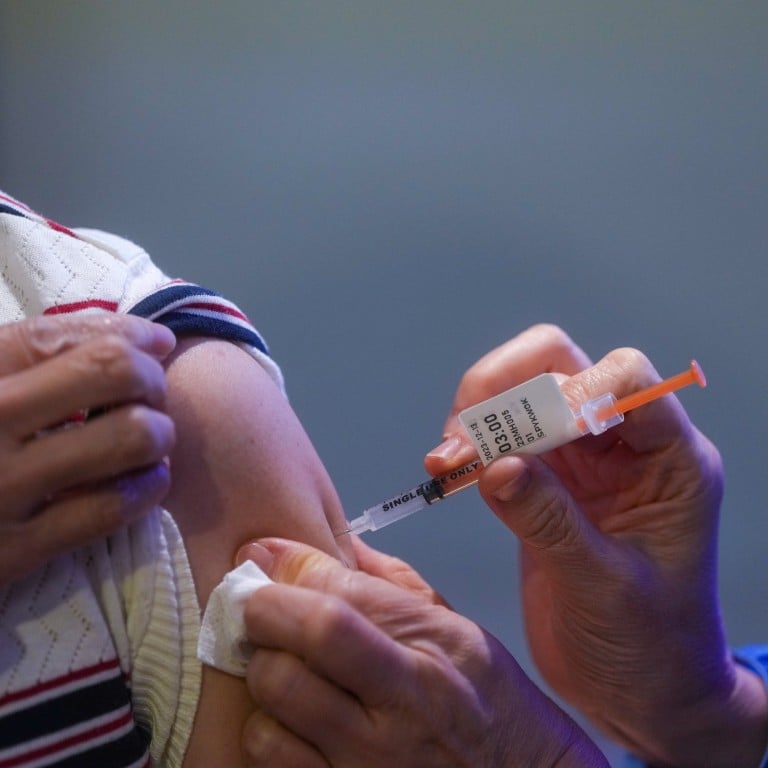
Hong Kong may see sharp rise in Covid cases in next 2 months, experts say, urging vulnerable groups to get booster jabs
- HKU health scholars also encourage residents to switch up vaccine regime, such as going from Sinovac shots to BioNTech or Moderna mRNA boosters
- About 80 per cent of patients in Hong Kong’s public hospital disease wards currently ‘severe’ Covid-19 cases, expert says
Medical experts in Hong Kong have warned that Covid-19 cases could rise sharply in the next two months, urging those deemed at high risk to get vaccinated with the latest generation of jabs before the Lunar New Year break.
The two health scholars from the University of Hong Kong (HKU) on Sunday also advised residents to try “mixed” jabs, such as those who initially started with Sinovac shots opting for a BioNTech or Moderna mRNA booster.
They added that now was the time to get a booster jab to ensure those in vulnerable groups could build sufficient immunity levels before the coming holiday.

Professor Ivan Hung Fan-ngai, the university’s chair professor of infectious diseases, said Covid-19 infections could increase in the next month or so, pointing to a recent surge in severe cases requiring hospitalisation.
About 80 per cent of patients in Hong Kong’s public hospital disease wards were currently “severe” Covid-19 cases, another 10 per cent had severe flu and the remainder had other infections, he said.
The medical scholar said that while Covid-19 was now endemic, the risk of severe infections remained for vulnerable groups such as the elderly, immune compromised and children.
He urged those in high-risk groups to get the latest vaccine targeting the XBB virus variant “as soon as possible”.
Hong Kong can tackle surging Covid and flu infections: health minister
According to health authorities, a sample collection uncovered 579 Covid-19 cases in the week ending January 13, compared with 538 the week before.
The number of virus-related deaths dropped from 30 to 26 over the same period.
But Hung warned infections could rise rapidly in the coming week.
“So if it’s 500 now, next week, we may be up to 1,000 who required hospitalisation,” he said. “So that is a rapid rise.”
The HKU scholar also said the XBB vaccine was effective against the targeted variant and the circulating JN.1 strain, with the jab offering a “much better boosting effect of up to about 20 to 30 times”.
Hong Kong enters winter flu season with number of outbreaks doubling this week
Switching from an initial round of Sinovac jabs to mRNA boosters from makers such as BioNTech and Moderna was also an “extremely safe and very effective” option, he said.
“Some studies actually showed that if you have been receiving BioNTech and cross over to receive the Moderna vaccine, the antibody, the immunogenicity is even better.”
Dr Mike Kwan Yat-wah, an honorary associate professor at the university’s department of paediatrics and adolescent medicine, stressed that now was the best time to get a third-generation vaccine as a booster shot.
He added that the jabs took two weeks to produce antibodies, with only a few weeks left before the Lunar New Year holiday began on February 10.
“Please go and have a booster dose of the vaccine if you are the appropriate population to receive this,” he said.
Mask sales rise as Hong Kong heads into flu season and Covid cases climb
Health officials earlier cited advice from the World Health Organization that there was no evidence to show the JN.1 variant posed a greater public health risk on a global scale in comparison with other common strains.
Hung on Sunday said the advice referred to the general public, but those in high-risk groups were more likely to develop severe infections, become hospitalised or even die from Covid-19.
“We know that the JN.1 is not more pathogenic, is probably less pathogenic, but it is more contagious,” he said. “So that’s why these high-risk patients should get the boosting dose.”

